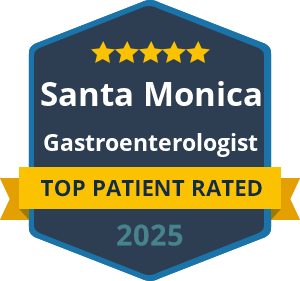
Esophageal cancer is a serious condition that develops in the esophagus, the long tube that connects the throat to the stomach. Early detection is crucial for successful treatment, but many people may not recognize the warning signs because early symptoms can be subtle. At the practice of David P. Yamini, MD, specializing in gastroenterology and liver disease in Santa Monica and Beverly Hills, we are dedicated to helping patients understand the symptoms and risk factors associated with esophageal cancer. Early diagnosis can significantly improve outcomes and quality of life.
What Is Esophageal Cancer?
Esophageal cancer occurs when abnormal cells form and grow in the lining of the esophagus. There are two main types:
- Adenocarcinoma: Often associated with gastroesophageal reflux disease (GERD) and Barrett’s esophagus, this type typically develops in the lower part of the esophagus.
- Squamous Cell Carcinoma: This type often occurs in the upper or middle part of the esophagus and is more common in people who smoke or consume excessive alcohol.
Esophageal cancer is relatively rare but still affects approximately 20,000 people in the U.S. each year, according to the American Cancer Society (ACS). Unfortunately, many cases are diagnosed in later stages due to a lack of awareness of early symptoms.
Early Symptoms of Esophageal Cancer
Although early-stage esophageal cancer may not cause noticeable symptoms, there are some signs that can indicate a problem. Recognizing these early symptoms can lead to prompt medical attention and potentially life-saving treatment.
1. Difficulty Swallowing (Dysphagia)
One of the earliest and most common symptoms is difficulty swallowing, especially with solid foods. As the cancer grows, it can narrow the esophagus, making it feel like food is getting stuck in the throat or chest. Over time, swallowing even soft foods or liquids may become difficult.
2. Chest Pain or Discomfort
Mild or moderate chest pain or a burning sensation behind the breastbone may occur. While this symptom can be mistaken for heartburn or acid reflux, persistent or unexplained chest pain should be evaluated by a medical professional.
3. Unexplained Weight Loss
Many patients experience unintentional weight loss due to difficulty eating or a loss of appetite. If you notice a significant drop in weight without changes to your diet or exercise routine, it may be an early warning sign.
4. Persistent Heartburn or Acid Reflux
Chronic heartburn or acid reflux is a risk factor for esophageal cancer, particularly adenocarcinoma. If you have ongoing reflux that does not respond to treatment, it may indicate damage to the esophagus that could increase your risk of cancer.
5. Hoarseness and Chronic Cough
Changes in your voice, such as hoarseness or a chronic cough that won’t go away, may also be early symptoms. This can occur when cancer affects nerves in the throat or irritates the esophageal lining.
6. Fatigue and Anemia
Fatigue, weakness, or symptoms of anemia, such as shortness of breath or pale skin, may develop if the cancer causes bleeding in the esophagus. This symptom is often more common in later stages but can sometimes appear early.
When to See a Doctor
If you are experiencing any of the symptoms listed above—especially if they persist or worsen—it’s important to seek medical attention. Dr. Yamini specializes in diagnosing and treating conditions affecting the gastrointestinal tract, including esophageal cancer. Early screening and diagnostic tests, such as endoscopy and biopsy, can help detect abnormalities before cancer progresses.
Additionally, people with certain risk factors should be especially vigilant. These include:
- A history of GERD or Barrett’s esophagus
- Smoking or excessive alcohol consumption
- Obesity
- A family history of esophageal cancer
If esophageal cancer is suspected, Dr. Yamini may recommend diagnostic procedures, including endoscopy, imaging tests or biopsy. Treatment options vary depending on the stage of the cancer but may include surgery, radiation therapy, chemotherapy, and targeted therapy. Early-stage cancer is often more treatable, emphasizing the importance of early detection and prompt care.
Take Control of Your Health
Esophageal cancer is a serious disease, but early detection can improve survival rates and treatment outcomes. If you are experiencing symptoms or have risk factors for esophageal cancer, Dr. David P. Yamini and his team in Santa Monica and Beverly Hills can provide expert diagnosis and care.
Contact us today to schedule a consultation and take the first step toward protecting your health.
Posted on behalf of




